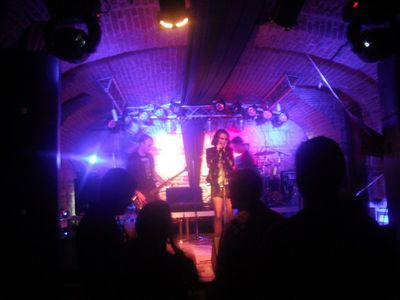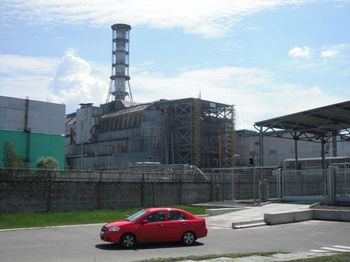We are developing the social individualist meta-context for the future. From the very serious to the extremely frivolous... lets see what is on the mind of the Samizdata people.
Samizdata, derived from Samizdat /n. - a system of clandestine publication of banned literature in the USSR [Russ.,= self-publishing house]
|
Traditional journal based scientific peer review works as follows. A researcher does his research and writes his paper. He then submits the paper to the editor of a journal. The editor of the journal then sends the paper to a number (usually two or three) of other researchers in the same field. These researchers then write short reports on the paper outlining what is good or bad about it and usually suggesting improvements, along with a recommendation as to whether the paper should be accepted by the journal. The reports are then forwarded to the author of the paper, who responds to suggested changes and then sends a revised version of the paper to the journal. After possibly several repetitions of this, an accepted paper will eventually be published in the journal.
Referees are supposedly anonymous. However, the author, the editor, and the referees often work in small fields where everybody knows one another, and people’s beliefs, foibles and writing styles are often well known, so this anonymity is often more theoretical than real. The theoretical reason for anonymity – that the referee can say what he pleases without consequences – is not always entirely true. The anonymity is one sided: the referee receives a paper with the name of the author at the top. The name of a famous and influential scientist at the top has an impact. The editor is very powerful, as he gets to select the referees and by choosing referees carefully clearly has influence whether a paper will be published or not. A good editor will choose referees of mixed levels of seniority (referees include everybody from graduate students to senior professors), and (in areas of some dispute) of mixed positions in any argument.
There are various ways in which this process can be corrupted, but (certainly in the field I worked in) this generally did not happen. Publishers of journals made a point of appointing people of integrity as editors. It was in their self-interest to do this, because the long term consequences of not doing so would be a loss of credibility for the journal. The danger, always, is that authors, editors, and referees all end up coming from the same clique, in which such a process can be corrupted.
Another danger is that fields become isolated from each other, and workers in one field do not properly absorb knowledge and techniques from other fields. Many scientists (and non-scientists) for that matter use a great deal of statistics in their work, and do a great deal of computer programming in their work. Often, they will not be experts in either statistics or computer programming. Sometimes they will do good work from a statistical perspective, and write good computer code. On the other hand, if their work is to be published in peer reviewed journals, and the referees for the papers selected by those peer reviewed journals are not experts in statistics or computer science, and use similarly sloppy methods themselves, then poorer quality work can at times be gotten away with (similarly, you should beware of anyone in business or finance who tells you that his “proprietary black box model” tells this, and that he cannot show it to you because it is “proprietary”. Similar situations of sloppy code and statistics are endemic here, too).
The obvious point is that, when relevant, the peers who do the peer review should include statisticians and computer scientists as well as other workers in the precise field as the author of the paper. Science has become very specialised, and specialists in the same field do not talk to experts in other fields nearly often enough. However, the techniques different scientists use are not nearly as specialised as many proponents think they are. With some effort, experts in one field can understand the work of experts in another.
Traditional peer review does not encourage this.
Which is why in many of the most rigorous, competitive fields, in which really good, high quality science is done, traditional peer review has lost much of its relevance.
Some history… → Continue reading: Peer review and open science
(1) A Cathay Pacific Flight between Hong Kong and Sydney – July 1987
Michael’s mother: “I would like a Coke”
Michael “I would like a Coke, too
Flight attendant “Ah… Two”.
(Three glasses of Coca-Cola arrive soon afterwards).
(2) An expat bar in Maputo, Mozambique – February 2007.
Michael: “Two-Em”, please. Michael points to a beer tap marked “2M”. Of course, the name of the beer is actually pronounced “Dos-Em”, this being a Portuguese speaking country. The number “Two” is understood, as English is probably the predominant language spoken by expats in Maputo, which is unsurprising given the nature of the world and the proximity to South Africa. However, the beer is named “Dos-Em”. That is different.
Two beers are thus placed in front of Michael. He smiles, and hands over a large enough banknote to pay for both of them.
(3) A (literally) underground music club, Cluj-Napoca, Romania – December 2009.
A heavy metal band has been followed by a slightly less heavy metal guitar band with a (good) female lead singer. This is definitely Dale Amon’s sort of place. Michael is sitting at a table. He is approached by a waitress.
Michael: “Timisoreana, thanks”. Timisoreana is a beer from the beautiful city of Timisoara, perhaps a hundred klicks away, but the beer is widely available throughout Transylvania.
Waitress: “Da”. Romanian is a Romance Language, but contains a lot of vocabulary from the Slavic languages, including the word for yes. Given the history and ethnic composition of the country, it probably contains a fair few Germanic and Finno-Uguric words too, but I am not expert enough to know for sure. Michael sits for about two minutes. Another waitress approaches. She says something in Romanian, which Michael does not understand but undoubtedly translates as “What can I get you?”
Michael: “I have already been served by somebody else”
Waitress: “Ah, Ursus“. Ursus is a beer produced locally in the city of Cluj Napoca, which (like Timisoreana, and for that matter 2M) belongs to the giant multinational brewing leviathan SAB Miller. The brewery does a rather good dark beer, too. The German ethnic minority have left their mark on this part of Europe. Michael waits another two minutes. Two waitresses return, more or less simultaneously, one with a Timosoreana, and the other with an Ursus. They look at one another in slight confusion. Michael smiles as broadly as possible – not generally difficult when faced with young Romanian women – pays a ridiculously small sum of money to each of them, and finds himself with two beers.
This sort of thing might happen slightly less frequently if I were not a monolingual Anglophone. Or perhaps not. And if it did, I am not sure if it would make things more or less fun. But I love traveling, and one of the most important principles of my kind of traveling is that it is important to have mastered the ancient Confucian principle of going with the flow.
And the problem of having accidentally purchased two beers instead of one is generally a relatively easy one to deal with.
“Leute wie Sie standen auf den Mauer-Wachtürmen der roten Sozialisten, Sie überwachten die Wachtürme der braunen Sozialisten. Und, …, Leute Ihres Schlages werden auf den Wachtürmen der grünen Sozialisten stehen und deren Umerziehungslagern zu klimatologisch korrekten Staatsbürgern.”
(“People like you stood in the guard towers of the red socialists’ wall, they stood in the brown[shirt] socialists’ guard towers. And people of your stripe will stand in the guard towers of the green socialists and their reeducation camps for climatologically correct citizens.”)
– Commenter Frank39, who appears to have lived in East Germany, responding to another commenter on a post on Climategate from the German “Science Skeptical” blog. My thanks to the anonymous correspondent in Germany who pointed this out and provided me with the translation.
A few weeks ago, we were having one of many conversations on this blog about the subject of climate change. In the comments, I said the following
The climate is clearly changing. There is nothing unusual about this. The climate is always changing. I’m happy to concede that the trend in recent decades has been to hotter temperatures. Again, nothing unprecedented about that. The world has hot periods and cold periods. The trend seems to have slowed or reversed over the last few years. This is not a short enough period of time to prove anything, but it does make you wonder how strong the trend is. Some of the data analysis that purports to show the trend has been presented in ways that deliberately or otherwise state the data in such ways that appear to indicate the trend is stronger than it is, and/or choose starting points and data series lengths that appear to show the trend as more abnormal than it is, in my opinion.
Again, with the impact of human activity, I am happy to concede an impact exists. There is a lot of human activity – it must have some impact on the climate. Whether it is a significant impact is another question.
Having those two thoughts, you look for a correlation, and find one between CO2 in the atmosphere and average temperature. One can be found, although it is not clear whether it is a causal relationship (CO2 levels vary historically before significant human activity existed, and a lot of the time CO2 increases seem to trail temperature changes rather than the other way round).
So how much are higher temperatures caused by higher CO2 levels, and how much of the increased CO2 level caused by human activity? The answer to the last question is clearly “quite a lot”, but that is not an answer to the question “How much?” Is it “70%? 90%? 100%? 120%? To be able to come up with a meaningful model, we have to have a good numerical answer, and we don’t remotely.
As to what impact increased CO2 levels have on average temperatures, there is much greater uncertainty. Basically you have to enter a fudge factor into your model, see how well it models the past, and hope you can then model the future successfully. A few people have created models that can just about model the past, but that doesn’t mean you have the mechanism right – it just means you have found a mathematical function that fits the points on your curve.
As it is, we have a few extremely crude mathematical / computer models that suppose mechanisms that go from human activity to CO2 release to global warming. They don’t agree with one another, and they are incredibly crude. (The Earth’s atmosphere is an extremely complex system. These models only have a tiny fraction of its complexity). They have a poor record of predicting the future.
The science of global warming ultimately boils down to saying that “The level of warming is unprecedented”. “Human releases of CO2 into the atmosphere are unprecedented”. “Therefore, the second causes the first”. This isn’t an inherently ridiculous thing to say. If climate change really is unprecedented then we would look for other unprecedented things as likely causes and human activity would be the likely one. We could then look for mechanisms and solutions, but we would largely be doing so with our eyes closed.
I will listen to somebody who more or less says this and that the risks of global warming are so great that we must do something about them, but somebody who simply states that the science is settled and beyond discussion is frankly not even worth arguing with.
In response, I received a mocking reply from a true believer, saying more or less that if I knew so much about it, why didn’t I publish papers in a refereed journal myself, and he was sure that a Nobel Prize would be beckoning. There was no attempt to address anything I said – merely an observation that what I was saying did not have the approval of the clique controlling the argument.
In a way this was odd, because I was not actually claiming to know anything about the workings of the climate: only about the likely limitations of the methodology of climate scientists.
As it happens, once, in another life, I was a research scientist. → Continue reading: A few thoughts on Climategate.
“But another real benefit is that once you have registered no-one can steal your identity”
– Home Office minister Meg Hillier, explaining the benefits of getting an ID card. Good to know that the science is settled, there.
Seriously, though. What are these people smoking?
 Bremen, Germany. November 2009
The following is an account of a visit to Chernobyl I made over the summer. However, first an only slightly related personal plea, if anyone in our wonderful techie readership has expertise in the electrical systems of Hitachi hard drives, or knows a business with specific expertise in data recovery from such drives, could you please read this and get back to me. I would stress that expertise is more important than location: if you are or know someone really good in Taipei or Fresno, that is still greatly helpful.
In 1986 I was in my final year of high school in Australia. The Cold War was still in force, and although some liberalisation had occurred in the Soviet Union, it felt like part of the natural order of things. The USSR was dark, strange, mysterious, and seemingly eternal. There was a wall down the middle of Europe, and nothing was more stark than the two sides of that wall. In April that year, workers at a nuclear power plant in Sweden detected excessively high levels of radiation. After briefly panicking about their own reactor, they realised that the radiation levels were higher outside than inside the building, and that the radiation was coming from somewhere else. Within a few days we knew that there had been an accident at the Chernobyl nuclear power plant north of Kiev in the Ukraine. Over the years, we have learned more about what happened, and the word “Chernobyl” has entered the world vocabulary, at times as a general word denoting a terrible catastrophe or destruction. We learned of firemen sacrificing their lives to contain the disaster, of evacuations of cities, and eventually of a strange forbidden zone that reflected the times and earned a place in certain kinds of popular culture. Even culture that preceded it sometimes now seems to have a strange sense of being about it.
 I am not usually one for organised tours, but there are places where one has no other alternative. Sometimes one needs the expertise of a local, and sometimes there are places in which one is simply not permitted to go other than on an organised tour. The so called Zone of Alienation around the Chernobyl nuclear reactor is such a place.
In any event, in June I visited Kiev (*) in the Ukraine. I have been pushing further east into the former communist countries on my travels in recent times, and going to the Ukraine was an obvious next step. I have still not been to Russia – the amount of nonsense that one must go through to simply get a Russian visa rather puts me off – but the Ukraine is now in an interestingly semi-westernised state where one can get there on discount airlines and most westerners no longer require a visa, but which is outside the EU and NATO. Democracy and what middle class that exists is relatiely fragile, and one still can encounter Soviet style bureaucracy. Businesses from further west tread cautiously.
However, my main reason for going was that I wanted to see that mysterious forbidden zone. → Continue reading: A trip to Chernobyl and the USSR
I am the only libertarian who has read all six VAT directives
– Philip Chaston.
“What I’m saying is that this does set me apart. One of the most frightening things about your true nerd, for many people, is not that he’s socially inept – because everybody’s been there – but rather his complete lack of embarrassment about it.”
“Which is still kind of pathetic.”
“It was pathetic when they were in high school,” Randy says. “Now it’s something else. Something very different from pathetic.”
“What, then?”
“I don’t know. There is no word for it. You’ll see.”
– Neal Stephenson, Cryptonomicon
I am in one of my favourite bars, in a railway arch in Peckham in South East London. Good music. Friendly staff and customers. Czech beer on tap. A quite decent Mendoza malbec. Fast and free Wifi (yes, I am hiding behind my laptop. Yes, I am a nerd. If you do not like that, well fuck you). The woman opposite me seems to be staring a little too excessively into the eyes of the man opposite me. Nice for them, no doubt (and yes, I may be bitter, although I am perfectly sincere when I say that this is nice for them and I wish them well).
However, a member of staff just came over, telling me that (sadly) the bar was closing soon (it is 10pm), and asking me to sign a petition, requesting that their licensing hours be increased, so that they can close at midnight rather than the present 10pm.
The story behind this is this. During the first world War, licensing hours in Britain were imposed, requiring bars to close at 11pm. Allowing people to go out drinking after this apparently hurt the war effort. In my native Australia, a 6pm closing hour was imposed at the same time, In some jurisdictions this lasted until the 1960s. But I digress. And this is now generally gone.
My friends from the Latin countries have always been shocked by the 11pm closing hours in England. Coming from countries where they would barely considering going out before midnight, they have always found this odd, to say the least. But the 11pm close was fairly standard, none the less.
However, three or four years ago, things in the UK changed. Responsibility for licensing bars had for a long time been the responsibility of magistrates. If an applicant could demonstrate that he was responsible, then a licence to open a bar would generally be given.
However, the law was changed, so that licensing became the responsibility of local councils – theoretically elected, but much easily bullied by national government than magistrates. Theoretically, this meant more flexibility with respect to licensing hours. At the time, this was sold as allowing bars to open later. In some parts of London, this is true. Generally, the louder and less pleasant places to be are the ones with the later opening hours.
On the other hand, I am in a bar at 10pm on a Monday night. This bar is full of perfectly nice people who are no trouble to anyone. And we are being thrown out onto the street at 10pm.
Why?
Update: As I was on my way out, I stopped and asked the landlord for more details as to the situation. Apparently he has a “facilities licence” allowing him to keep his bar open until midnight, but simultaneously, the council has invoked “planning laws” requiring him to close at 10pm on most nights. He pointed out to me what I knew already, which was that his bar occupies an arch underneath the main London Bridge to Brighton railway, on which (loud) trains run 24 hours a day. My experience is that I was visiting a pleasant bar containing a few perfectly nice people enjoying themselves. Heaven forbid that.
Microsoft has no taste. Who in the name of Allah thought this was a good idea?
Update: Here is some proof that this is real. Some people may find this video disturbing.
Windows 7, the new version of Microsoft Windows and the successor to Windows Vista, is officially released in two days time. On his blog, my good friend Patrick Crozier has asked a possibly not very important question, specifically
I’ve heard of Windows 3.1. I am about to a lot about Windows 7. But I’ve never heard a peep about Windows 4, 5 or 6. Were they, by any chance, really good versions of Windows that we never got to hear about because the praise for them was drowned out by complaints about 95, 98, 2000, Millenium and Vista?
I think we should be told.
The simple answer is of course that 95, 98, 2000, Millenium and Vista were Windows 4, 5 and 6, although not necessarily in that order. Microsoft decided in 1995 to abandon product numbers on many of its products, and replace them with names consisting of the years in which the product was released. Since then, they have released products with names consisting of product numbers, years, two letter codes that might or might not means something, and words that might or might not have anything to do with what the product is supposed to do, with versions of the same product seemingly seldom ever using the same convention twice.
If you ask Microsoft’s PR department, they will tell you that Windows 95/98/ME were Windows 4, Windows 2000 was Windows 5.0, Windows XP was Windows 5.1, and Windows Vista was Windows 6.0, which it appears to make a certain amount of sense to follow with Windows 7.
However, it is of course more complex than that, and I am going to attempt to explain it. Reading the rest of this post is unlikely to improve your life in any way, although it will teach you something about the mindset of Microsoft and/or that of nerds in general. Madness may lie at the end of it. However, here we go anyway.
→ Continue reading: The story on the Windows version numbers
|
Who Are We? The Samizdata people are a bunch of sinister and heavily armed globalist illuminati who seek to infect the entire world with the values of personal liberty and several property. Amongst our many crimes is a sense of humour and the intermittent use of British spelling.
We are also a varied group made up of social individualists, classical liberals, whigs, libertarians, extropians, futurists, ‘Porcupines’, Karl Popper fetishists, recovering neo-conservatives, crazed Ayn Rand worshipers, over-caffeinated Virginia Postrel devotees, witty Frédéric Bastiat wannabes, cypherpunks, minarchists, kritarchists and wild-eyed anarcho-capitalists from Britain, North America, Australia and Europe.
|








